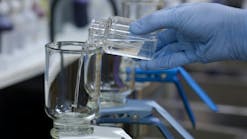JEFFERSON CITY, MO, July 23, 2009 -- Thirty-one drinking water systems in Missouri have chronically failed to complete required drinking water testing. The systems listed have at least three major monitoring violations in a 12-month period. While failing to monitor does not necessarily mean the water is unsafe, the Missouri Department of Natural Resources conducts routine testing in an effort to protect Missouri's citizens.
The Department requires all public water systems to test for bacteria at least once a month to verify these systems are providing safe drinking water to the public. The vast majority of community and non-community public water systems in Missouri comply with all monitoring requirements and meet all drinking water standards. Chronic violators are the exception rather than the rule. This current list of 31 systems represent only 1 percent of the approximately 2,800 public drinking water systems in Missouri.
Bacteriological testing can be the first step in identifying and correcting a contamination problem. The next step is to investigate the cause of any bad samples and perform corrective action, such as disinfecting and flushing the system. When a public water system has a record of both failing to monitor and a history of exceeding contaminant levels, this may raise concerns about the unknown quality of the drinking water.
If a water sample tests positive for total coliform bacteria, further testing is then performed for fecal coliform or E. coli bacteria, which can directly cause gastrointestinal illness. Most samples that test positive for total coliform, test negative for fecal coliform or E. coli. The total coliform-positive samples that are listed tested negative for fecal coliform or E. coli, unless specifically stated otherwise.
>> More details on the violators listed
>> Click here for a list of the failed systems
These systems' owners have been sent multiple violation notices in addition to certified letters informing them that chronic failure to monitor is a violation of Missouri's drinking water regulations. Representatives of the Department of Natural Resources also routinely make onsite inspections and attempt to reach an agreement with the responsible parties to ensure sampling requirements will be met. If these parties continue to fail to comply with Missouri's drinking water law, the Department pursues more stringent enforcement action through legal channels.
###


